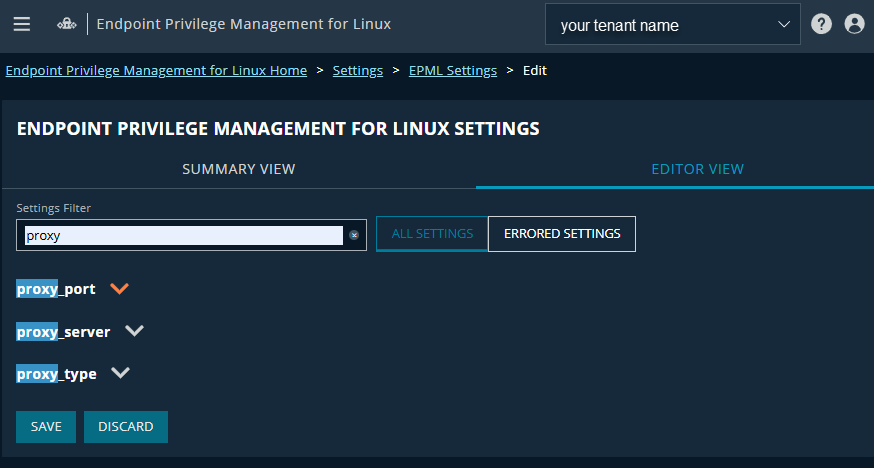Install your EPM-L package | EPM-L
If you do not have existing packages in EPM-L, start by creating new packages.
After installation, you must activate your packages.
Prerequisites
- To install EPM-L on Amazon Linux 2023 or RHEL 9+ (for x86_64, arm64, ppc64le, s390x), you must first install the libxcrypt-compat package using dnf/yum/rpm. This package provides the libcrypt.so.1 library required by EPM-L. For more information, refer to the system's documentation.
Create a new package
- From the top left of the BeyondTrust Home page, click
 > Endpoint Privilege Management for Linux > Installers.
> Endpoint Privilege Management for Linux > Installers.
The Linux Deployment Packages page displays. - Click Create Packages.
The following packages are created:- .RPM packages for Linux RedHat installations:
- epml-client.x86_64.rpm (recommended)
- Policy not cached on the endpoint
- Supported on Amazon Linux 2 and Amazon Linux 2023
- epml-cachedclient.x86_64.rpm
- Policy cached locally on the endpoint
- Not supported on Amazon Linux 2 and Amazon Linux 2023
- Can consume resources on the client, especially disk space for storing the cached files
- epml-client.x86_64.rpm (recommended)
- .DEB packages for Debian and Ubuntu installations:
- epml-client.amd64.deb (recommended)
- Policy cached locally on the endpoint
- epml-cachedclient.amd64.deb
- Policy cached locally on the endpoint
- epml-client.amd64.deb (recommended)
- .RPM packages for Linux RedHat installations:
- Click Instructions and follow the on-screen procedure to complete package creation and activation.
Add a passthrough proxy server
Optionally, add a passthrough proxy server to install the clients through a proxy server.
- Sign into app.beyondtrust.io.
The BeyondTrust Home page displays. - Click
 > Endpoint Privilege Management for Linux > EPML Settings.
> Endpoint Privilege Management for Linux > EPML Settings.
The Endpoint Privilege Management for Linux Settings page displays. - Click the Editor View tab.
- Enter proxy in the Settings Filter box.
Three settings display:- proxy_server (editable): The IP address or URL for the proxy server. The default value is none (no proxy support).
- proxy_type (non-editable): The only supported value is HTTP.
- proxy_port(editable): The port number of the proxy. Default value is 8080.

- Expand each proxy setting you want to update for your installer packages.
- Edit the setting(s).
- Click Save.
The proxy settings are now ready for your installer packages.
Download a package
If you download a package to a Windows or macOS computer, you must transfer the package file via SCP or SMB file transfer mechanisms to either the Linux client or a file system that’s secure and accessible from the Linux client.
If you download a package to a Linux client directly, you can save it to a local, secure folder.
-
From the top left of the BeyondTrust Home page, click
 > Endpoint Privilege Management for Linux > Installers.
> Endpoint Privilege Management for Linux > Installers.
The Linux Deployment Packages page displays. -
Locate the package you want to download.
- .RPM packages for Linux RedHat installations:
- epml-client.x86_64.rpm (recommended)
- Policy not cached on the endpoint
- Supported on Amazon Linux 2 and Amazon Linux 2023
- epml-cachedclient.x86_64.rpm
- Policy cached locally on the endpoint
- Not supported on Amazon Linux 2 and Amazon Linux 2023
- Can consume resources on the client, especially disk space for storing the cached files
- epml-client.x86_64.rpm (recommended)
- .DEB packages for Debian and Ubuntu installations:
- epml-client.amd64.deb (recommended)
- Policy cached locally on the endpoint
- epml-cachedclient.amd64.deb
- Policy cached locally on the endpoint
- epml-client.amd64.deb (recommended)
- .RPM packages for Linux RedHat installations:
-
Click the package name.
The download starts immediately.
Install the package to your machine
-
From the top left of the BeyondTrust Home page, click
 > Endpoint Privilege Management for Linux > Installers.
> Endpoint Privilege Management for Linux > Installers.
The Linux Deployment Packages page displays. -
From the list, locate the package you want to install.
-
Click the corresponding Instructions link to view the package-specific installation instructions.
Updated 5 days ago
